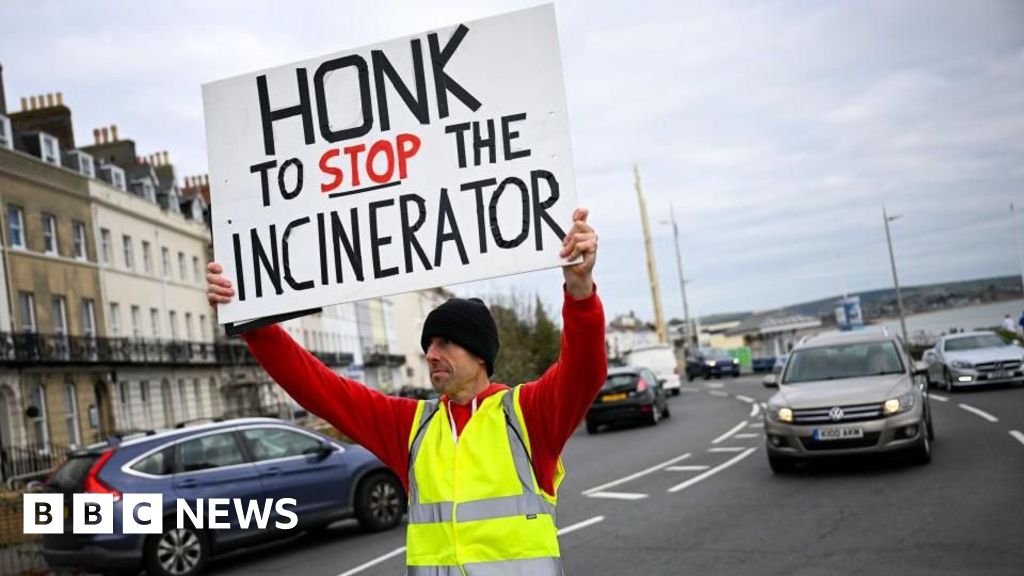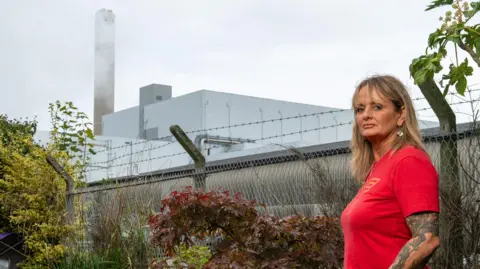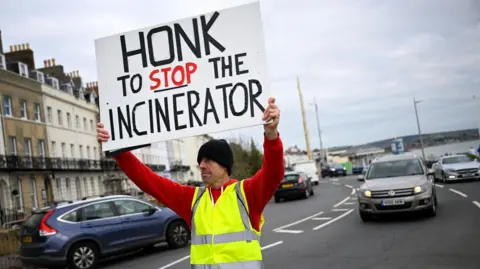
 BBC/Jon Parker Lee
BBC/Jon Parker LeeMinisters say fresh rules announced today will limit the development of new waste incinerators, which burn rubbish to make electricity and emit gases that are harmful for the environment.
Just under half of all the UK’s household rubbish is now burned, and a recent BBC investigation showed that incinerating bin bags, which can release large amounts of carbon dioxide, was as bad for the climate as burning coal.
Now the government is proposing that new household waste incinerators in England can only go ahead if they meet strict requirements, such as ensuring they reduce the amount of rubbish going to landfill or replace older, less efficient incinerators.
Ministers hope that if recycling and the reuse of rubbish improves, the country will produce less residual waste in the years ahead, and therefore less waste will need burning.
The announcement is not a ban or a moratorium on incinerators, such as those that exist in Wales and Scotland, and the one that was temporarily in place in England early in 2024.
The plans have had a cautious welcome from industry, while some campaigners who support the change say it could lead to the end of new incineration developments.
 Getty Images
Getty ImagesOver the past two decades governments have tried to limit the amount of waste going to landfill, as the planet-warming methane that’s emitted from these sites is very damaging to the climate.
They’ve done this mainly by raising the landfill taxes that councils have to pay to bury waste.
As a result, local authorities across the UK turned to burning waste for energy in large incinerators, often built in disadvantaged areas.
With 49% of waste collected now incinerated, this is having a negative effect on the climate because increasing amounts of plastic, made from fossil fuels, are being thrown away and burned, releasing large amounts of carbon dioxide.
There’s also been growing opposition to where incinerators in many communities across England are built, with locals worried over health and environmental impacts.
In Runcorn, Cheshire, home to the UK’s largest incinerator, operator Viridor paid a total of £1m to local families who had complained about noise, smells and other negative effects on their lives.
The new proposals, which the government terms a crackdown, will require future plants to reduce the amount of waste that is sent to landfill.
They will also need to demonstrate that they will be built ready to capture carbon that is emitted during burning, and to use heat generated for local heating or industry. Only nine of the 52 major incinerators in the UK currently export their heat in this way.
“For far too long, the nation has seen its recycling rates stagnate and relied on burning household waste, rather than supporting communities to keep resources in use for longer,” said Circular Economy Minister Mary Creagh.
“That ends today, with clear conditions for new energy from waste plants – they must be efficient and support net zero and our economic growth mission, before they can get the backing needed to be built.”
The new plan suggests that the UK is already close to capacity when it comes to the amount of rubbish we can burn and that there is a “limited need” for future plants.
Today’s proposal includes projections that the UK will have enough energy from incinerators to deal with 18.8 million tonnes of residual waste by 2035. The government believes that the UK will only need to manage 17.6 million tonnes by 2042.
It also suggests that local concerns will be more fully considered when deciding on these new developments.
Government sources recognise that there will still be an ongoing requirement for energy from waste incinerators especially in areas of England where recycling infrastructure is not well developed.
However campaigners believe the government’s acknowledgement that there is already enough capacity to cope means it is unlikely that any new incinerators will be built.
“It is clear that the age of waste incineration is over,” said Shlomo Dowen, who is the national co-ordinator of the UK Without Incineration Network (UKWIN).
“We hope that the government’s latest announcement will result in the abandonment of incineration schemes currently being proposed. This would free up funds to invest in the top tiers of the waste hierarchy, including the creation of many new jobs in the repair, reuse, redesign and recycling sectors.”




